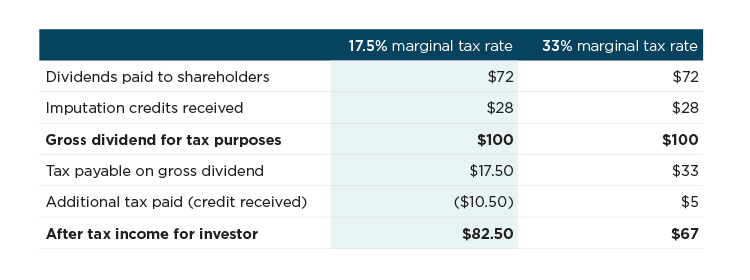INSIGHTS
JARGON BUSTER: IMPUTATION CREDITS
Roy Davidson, 30 September 2020
Tax isn’t most people’s favourite subject, but, knowing a little bit about it can come in handy from time to time. In this jargon buster we explain what imputation credits are, why they are good for investors, and why New Zealand is quite unique in having them.
What are imputation credits?
Imputation credits are essentially a tax credit that investors receive from companies when they pay a dividend. This reflects the corporate tax that the company has already paid. An investor can use the imputation credit to reduce the income tax they have to pay on some or all of the dividends they have received from the company.
As the company tax rate is 28 per cent, this means that if you’re on a higher tax rate (for example, 33 per cent) you’ll still pay a bit of tax on your dividends (5 per cent more). Conversely, if your tax rate is lower than 28 per cent, you can receive a refund.
The table below compares how this works for two investors, one on a marginal tax rate of 17.5 per cent, and one on a marginal tax rate of 33 per cent.

Imputation credits avoid double taxation
Imputation credits were introduced in New Zealand in 1989 with the purpose being to avoid double taxation – where the same income is taxed twice.
Companies pay tax on the profits they generate. After they pay this tax they then have the remainder which they can use to pay shareholders a dividend (amongst other things like reinvesting in the business).
In the absence of the imputation credit regime, shareholders would pay tax again on the dividends they receive as it is counted as income. However, the money they are receiving in the form of dividends has already been taxed at the company level. Taxing it again would be taxing the same money twice.
By allowing shareholders to use imputation credits, the fact that companies have already paid the tax is taken into account, ensuring that profits are ultimately taxed at the shareholder’s marginal tax rate, and no more.
Do all companies’ dividends have imputation credits?
Not all companies distribute imputation credits with dividends, and some that do distribute them do it at less than the maximum amount.
There are three key factors that determine how many imputation credits a company has to distribute to shareholders:
- The proportion of profits earned in New Zealand. Companies that generate a substantial portion of their profits in New Zealand will likely have a more highly imputed dividend than those that derive profits offshore and therefore pay tax in other jurisdictions.
- The amount of reported profit. Some companies have lower reported profits than the cash flow from which they can pay dividends. This could be due to, for example, high levels of depreciation which is a non-cash expense, lowering profit but not affecting cash flows. As profits are lower, tax is lower, and these companies therefore have fewer imputation credits to attach to their dividends.
- Dividend payout ratios. Companies that pay out a lower amount of their profits as dividends are likely to have a more highly imputed dividend than those that pay out more.
Do other countries have imputation credits?
Very few countries have an imputation credit regime in place, although Australia is one of the others that does. Several other countries deal with the double taxation issue differently, with some not even taxing dividend income.
Just as imputation credits are only available to New Zealand taxpayers, Australian franking credits are only available to Australian taxpayers, meaning the vast majority of New Zealand investors are unable to benefit from them. However, some Australian companies, notably the major banks, pay out imputation credits accumulated from the profits of their New Zealand subsidiaries, to New Zealand based shareholders.
New Zealand and Australia’s imputation credit regimes, and the lack of such schemes in other countries, gives rise to some interesting differences. For instance, New Zealand and Australian companies are much more likely to pay a bigger dividend as they know that investors will be able to utilise imputation credits.
In contrast, companies in the US are much less likely to pay a big dividend, and will instead opt to either keep the money, or use it to buy back their own shares on the market. This is termed a ‘share buyback’ and sees a company immediately cancel the purchased shares, thereby increasing the price of the shares (the company is the same size but there are now fewer shares). Why would a US company choose to do this? The simple answer is that the US capital gains tax rate is lower for most investors than the income tax rate.
Imputation credits incentivise local companies to pay dividends





